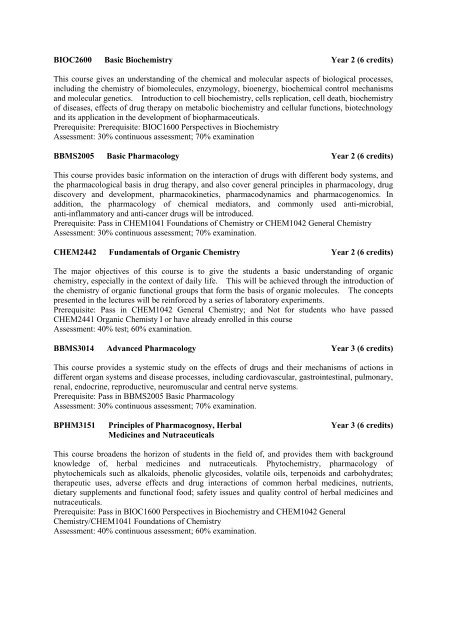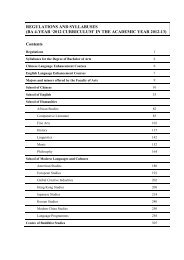Bachelor of Biomedical Sciences (BBiomedSc) - The University of ...
Bachelor of Biomedical Sciences (BBiomedSc) - The University of ...
Bachelor of Biomedical Sciences (BBiomedSc) - The University of ...
Create successful ePaper yourself
Turn your PDF publications into a flip-book with our unique Google optimized e-Paper software.
BIOC2600 Basic Biochemistry Year 2 (6 credits)This course gives an understanding <strong>of</strong> the chemical and molecular aspects <strong>of</strong> biological processes,including the chemistry <strong>of</strong> biomolecules, enzymology, bioenergy, biochemical control mechanismsand molecular genetics. Introduction to cell biochemistry, cells replication, cell death, biochemistry<strong>of</strong> diseases, effects <strong>of</strong> drug therapy on metabolic biochemistry and cellular functions, biotechnologyand its application in the development <strong>of</strong> biopharmaceuticals.Prerequisite: Prerequisite: BIOC1600 Perspectives in BiochemistryAssessment: 30% continuous assessment; 70% examinationBBMS2005 Basic Pharmacology Year 2 (6 credits)This course provides basic information on the interaction <strong>of</strong> drugs with different body systems, andthe pharmacological basis in drug therapy, and also cover general principles in pharmacology, drugdiscovery and development, pharmacokinetics, pharmacodynamics and pharmacogenomics. Inaddition, the pharmacology <strong>of</strong> chemical mediators, and commonly used anti-microbial,anti-inflammatory and anti-cancer drugs will be introduced.Prerequisite: Pass in CHEM1041 Foundations <strong>of</strong> Chemistry or CHEM1042 General ChemistryAssessment: 30% continuous assessment; 70% examination.CHEM2442 Fundamentals <strong>of</strong> Organic Chemistry Year 2 (6 credits)<strong>The</strong> major objectives <strong>of</strong> this course is to give the students a basic understanding <strong>of</strong> organicchemistry, especially in the context <strong>of</strong> daily life. This will be achieved through the introduction <strong>of</strong>the chemistry <strong>of</strong> organic functional groups that form the basis <strong>of</strong> organic molecules. <strong>The</strong> conceptspresented in the lectures will be reinforced by a series <strong>of</strong> laboratory experiments.Prerequisite: Pass in CHEM1042 General Chemistry; and Not for students who have passedCHEM2441 Organic Chemisty I or have already enrolled in this courseAssessment: 40% test; 60% examination.BBMS3014 Advanced Pharmacology Year 3 (6 credits)This course provides a systemic study on the effects <strong>of</strong> drugs and their mechanisms <strong>of</strong> actions indifferent organ systems and disease processes, including cardiovascular, gastrointestinal, pulmonary,renal, endocrine, reproductive, neuromuscular and central nerve systems.Prerequisite: Pass in BBMS2005 Basic PharmacologyAssessment: 30% continuous assessment; 70% examination.BPHM3151Principles <strong>of</strong> Pharmacognosy, HerbalMedicines and NutraceuticalsYear 3 (6 credits)This course broadens the horizon <strong>of</strong> students in the field <strong>of</strong>, and provides them with backgroundknowledge <strong>of</strong>, herbal medicines and nutraceuticals. Phytochemistry, pharmacology <strong>of</strong>phytochemicals such as alkaloids, phenolic glycosides, volatile oils, terpenoids and carbohydrates;therapeutic uses, adverse effects and drug interactions <strong>of</strong> common herbal medicines, nutrients,dietary supplements and functional food; safety issues and quality control <strong>of</strong> herbal medicines andnutraceuticals.Prerequisite: Pass in BIOC1600 Perspectives in Biochemistry and CHEM1042 GeneralChemistry/CHEM1041 Foundations <strong>of</strong> ChemistryAssessment: 40% continuous assessment; 60% examination.
















